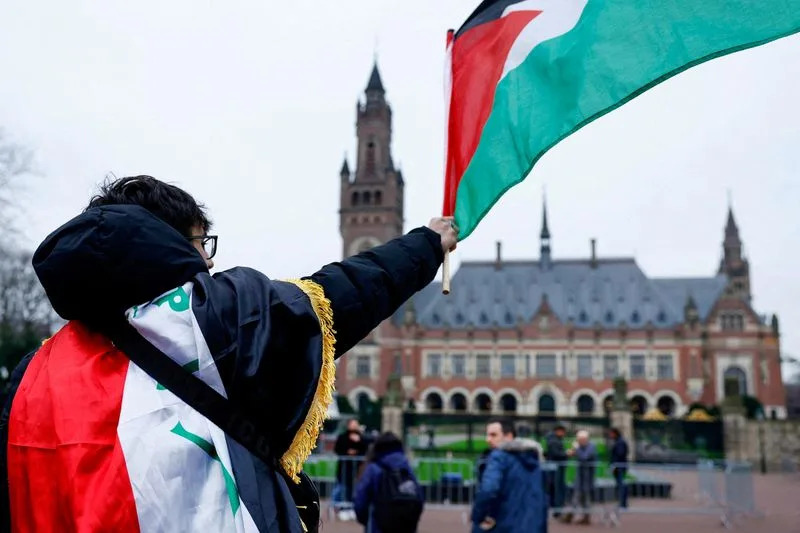China asked the International Court of Justice (ICJ) on Thursday to give its opinion on Israel's occupation of the Palestinian Territories, which it said was illegal.
ICJ holds public hearings on the legal consequences of Israel's occupation of Palestinian territories, in The Hague.
"Justice has been long delayed, but it must not be denied," China's Foreign Ministry's legal adviser Ma Xinmin told the court in The Hague, in the Netherlands.
"Fifty-seven years have passed since Israel began its occupation of the OPT (Occupied Palestinian Territories). The unlawful nature of the occupation and sovereignty over the occupied territories remain unchanged," he said.
The U.N.'s top court, also known as the World Court, this week is hearing arguments from more than 50 states following a request by the U.N. General Assembly in 2022 to issue a non-binding opinion on the legal consequences of the Israeli occupation.
The hearings are part of a Palestinian push to get international legal institutions to examine Israel's conduct, which has become more urgent since the Oct. 7 attacks by Hamas in Israel, which killed 1,200 people, and Israel's military response that has since killed about 29,000 Palestinians.
Israel, which is not taking part in the hearings, said in written comments that the court's involvement could be harmful to achieving a negotiated settlement.
On Monday, Palestinian representatives asked the judges to declare Israel's occupation of their territory illegal and said its opinion could help reach a two-state solution.
The judges are expected to take roughly six months to issue an opinion on the request.
U.S. defends Israeli security at ICJ hearing on occupation of Palestinian lands
U.S. State Department official Richard Visek told the International Court of Justice Wednesday it should not issue an advisory opinion requiring unconditional withdrawal by Israel without considering Israel's "legitimate security needs."
The United States Wednesday defended Israel's security needs as the International Court of Justice considers an advisory opinion on Israeli occupation of Palestinian territories.
During the third day of hearings at The Hague, U.S. State Department official Richard Visek testified that the court's advisory opinion should not call for a "unilateral, immediate and unconditional withdrawal by Israel that does not account for Israel's legitimate security needs."
"Any movement toward Israel's withdrawal from the West Bank and Gaza requires consideration of Israel's very real security needs," Visek said.
Fifty-two countries are before the ICJ arguing for Israeli withdrawal from the West Bank and east Jerusalem and an end to its control over Gaza.
The hearings are based on a U.N. General Assembly request for a non-binding advisory opinion on whether Israel's occupied Palestinian territory policies are legal under international law.
Palestine's Foreign Minister Riyad al-Maliki told the ICJ that Israel's occupation amounts to colonialism and apartheid. He said territory maps show progressive loss of Palestinian territories since 1920 as Israeli occupation continues.
Visek told the court the United States is intensively engaged with multiple nations "not only to address the current crisis but to get beyond where we have been, namely to advance a political settlement that will lead to a durable peace in the region that includes lasting security for Israelis and Palestinians and a path to Palestinian statehood."
He said there is broad international support for a two-state negotiated solution to the Israeli-Palestinian conflict that gives rise to "a Palestinian state, a solution in which two peoples live side-by-side with equal measures of freedom, security, opportunity and dignity."
Visek said both withdrawal from occupied Palestinian territory and security guarantees are necessary for a just and lasting peace. He said Israeli withdrawal from occupied Palestinian lands depends on the end of belligerency.
He testified that two interdependent requirements are necessary for true peace.
"One is the withdrawal of forces from the occupied territory. And the other is peace and security for the states in the Middle East through the acknowledgment of the sovereignty, territorial integrity and political independence of every state in the area," Visek said.
South Africa and other nations are calling for an end to Israel's occupation of Palestinian territories in the case.
In a Jan. 26 order on the Gaza genocide question, the ICJ said Israel must abide by obligations under the Convention on the Prevention and Punishment of the Crime of Genocide in its actions against Palestinians in Gaza.
The court said that includes taking all measures within its power to prevent killing Palestinians and "deliberately inflicting on the group conditions of life calculated to bring about its physical destruction in whole or in part."
US asks world court not to call for Israeli pullout from Palestinian territories
The US has urged the international court of justice (ICJ) in The Hague not to issue a ruling calling for Israel’s immediate withdrawal from the occupied Palestinian territories, arguing that Israeli security had to be taken into account in any solution to the conflict.
“Any movement towards Israel’s withdrawal from the West Bank and Gaza requires consideration for Israel’s very real security needs,” Richard Visek, the state department’s acting legal adviser, told the ICJ judges.
Visek was stating the US position in ICJ hearings this week first requested by the UN general assembly in 2022. They are intended to establish the legal status of the occupied territories, and the implications for the international community’s approach to the conflict.
More than 50 states are due to present their stances in the week-long hearings, which have further emphasised the isolation of Israel’s few supporters, following a UN security council hearing on Tuesday in which the US was the lone vote against a draft ceasefire resolution, with the UK abstaining. The US and UK are expected to be virtually alone again at the ICJ hearings in urging restraint in its ruling on Israel’s occupation.
The ICJ is expected to issue its opinion by the summer, and it could have a far-reaching political and legal impact if it rules the occupation to be illegal. It could for example have implications for governments attempting to ban boycott campaigns aimed at products made in the occupied territories. It could also further increase the geopolitical costs to the US and UK in continuing to defend Israel on the world stage.
In laying out the US argument on Wednesday, Visek argued that both the UN security council and general assembly had established the path to a peaceful resolution through negotiations, which would fundamentally be about an exchange of land for peace.
“An enduring peace requires progress on both of these balanced elements,” he told the judges. “They have asked you to try to resolve the whole of the dispute between the parties through an advisory opinion, addressed to questions focusing on the acts of only one party.”
Visek insisted that Washington was not ruling out a role for the ICJ to play in the conflict but was instead appealing to the court to “carefully calibrate its advice” in light of the eventual need for a negotiated solution.
Most of the other states offering submissions in the case have argued the opposite: that the absence of negotiations in the face of the Israeli government’s adamant opposition to the establishment of a Palestinian state requires a decisive intervention from the ICJ.
“That is the central dispute between the US and many other states, about the prudence of the court advising on certain questions,” said Adil Haque, a professor at Rutgers Law School.
“Many other states have been saying, both today and over the last few days: what negotiations? There is no negotiation process going on. The Israeli government is not interested in a negotiation process that will lead to a solution and so there’s no reason for the court to pull its punches.”
Haque argued that there was a role for the ICJ to play in laying down the legal parameters for any negotiated settlement.
“Typically, in a negotiation, I have a legal right to something that you want, you have a legal right to something that I want, and we negotiate an exchange,” he said. “So the court can play a constructive role by telling the parties what their legal rights are, and then leaving it to them to negotiate from that legal baseline.”




